
This month, Ensemble Studio Theatre's second round of one-acts, Series B, opens right as the crowd is still catching its breath from Series A. This go around features a Global Warming Comedy of Errors, a poetic meditation on contemporary America, an unlikely friendship between a disabled man and his caregiver and the bedtime ritual of the world's most insecure couple. I chatted with the writers to hear a bit more about the work.
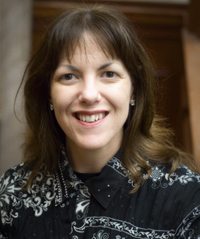 Caridad Svich's play The Hour of All Things is a one-person (note: not 'man' or 'woman') piece that examines a moment of clarity in its character, Nic. The play ripples into some very big questions, but as Svich tells me, it's not meant to answer them. Certainly not on its lonesome.
Caridad Svich's play The Hour of All Things is a one-person (note: not 'man' or 'woman') piece that examines a moment of clarity in its character, Nic. The play ripples into some very big questions, but as Svich tells me, it's not meant to answer them. Certainly not on its lonesome.
Caridad Svich: It’s a part of a trilogy of plays. The first one in that trilogy is a two-hander that examines the issues of globalization. And it’s a cross-cultural love story. The second one is a five-hander and it’s vaguely inspired by the Benghazi attacks. It’s about friends of a diplomat who have lost and are trying to parcel why they can’t get the proper information and as we know we still really don’t know what the hell happened. So I was just in kind of a mood to write things that were very intimate but also had a global scope. I felt like writing a one-hander. I don’t do it very often but I started writing and I was like “Oh, this is one person! Great!” And it’s actually a longer play. There’s a longer version.
How long?
Caridad Svich: It's an hour. When Billy [Carden, the piece's director and EST's Artistic Director] called me, which was really delightful, and said you’re in [the Marathon], I was like “yay!” and then we talked about how to make it an appropriate length for this. It was interesting to create a new version of it and really exciting, too. I wanted to deal with someone who was someone you’d pass by on the street and not think much of...putting them at the center of a story and having them go through a big journey. One that involves some aspect of myth and some aspect of conscience and political conscience. I was also thinking along the lines of being in the wake of the aftermath of Occupy Movement and feeling like “what happened?” I felt like there was all this energy and it seemed to dissipate, and so [this is] a little bit mourning that but also trying to figure out where we are now and how can we move forward with some of those ideals still in place.
In a one-person play like this audiences may be tempted to read your own ideals into this. In your mind is this more of a character piece? Are there parallels between Nic and yourself?
Caridad Svich: I was very much thinking of a character. What’s interesting about the piece in its original conception, and I still think it’s – shall I say this? Well, I will. It’s written for either a man or a woman to play. She’s deliberately in this version called “Nic” it would be Nic Male or Nic Female. "Nicola" or "Nicolas." But I know people who read it and have lived with it for a while always tell me “Oh, it’s a woman.” And I find that kind of surprising and interesting when people make that assumption right away and I don’t know if it’s because I’ve written it or just because they feel something in the text that feels gendered in that way. It may have a little bit with crying in the supermarket, but I don’t think that’s an exclusively female bastion.
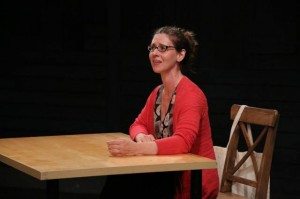
That's a big moment for her or him.
They're at a certain point in their life where they live a life of routine and they’ve kind of buried a lot of their not just anxiety—which the play deals with a lot—but feelings of being proactive or feeling like their voice matters. And then waking up one day. Billy was guiding Miriam [Silverman, who plays Nic] through the process and saying, "Hey, this is somebody who wakes up one day—and here it happens to be in the supermarket—and suddenly it goes 'Oh, what have I been doing with my life?'” It’s one of those trigger moments that opens it up.
Would you ever consider switching in production? Maybe alternating scenes?
Yeah! In some crazy universe it would be awesome to have it alternate night to night and see people react to even that idea behind it and how they’d respond. And also age. I had a reading of it—here at EST actually, a year ago, with a male actor who’s in his 60s, and it’s interesting actually cause someone at that age having these questions and ruminations has a different weight and charge around it; and also how much they’ve lived that life of routine, as opposed to Miriam who’s in her 30s. She’s not there, but is starting to have those kind of questions about her life, and she’s also a parent and so different things come to bear in that.
It’s great because the play is general enough to accommodate that—but there’s still this wonderful specificity to it.
Yeah. I do think it’s someone who lives in the western world. I do think it’s someone who lives in a city. They’re not like on a farm. (Laughs.)
Yes. I did notice at the end the country in question is referred to as just “a nation.” Proper nouns are kind of elided.
I try to keep it fairly open. I do think it’s a piece about the US but, you know, dilemmas around Western democracy and late capitalism affect more than just the US although I think they affect us in a big way. So I wanted to keep a little of that open without saying which city we’re in, et cetera. I know for Miriam it’s New York so that’s how she’s playing it.
You mentioned it’s a trilogy. Is this character in the other two pieces?
No. The idea being that whoever the actor is that’s playing this part gets to be in the two-hander and probably plays one of the key roles in the five-hander. So that it’s not the same character, but an audience would have a crazy experience because all three of the central journeys and the other two plays involve issues of awakening around political consciousness and also intimacy and how you conduct yourself in the world. So I sort of feel like Nic would be at the anxious end of that.
 Julia Cho's play Cora and Dave Are Getting Older, is also about anxiety--though of another order--right down to its origins. We chatted with her over the phone.
Julia Cho's play Cora and Dave Are Getting Older, is also about anxiety--though of another order--right down to its origins. We chatted with her over the phone.
Julia Cho: The origins of my plays are actually quite hazy. I think I almost deliberately try to forget where they came from. I believe part of it was I was going through a period of time where I was having trouble starting something new. So I like to do shorter pieces, shorter plays and I never turn down the opportunity to write one. At the time I was in touch with a woman named Sasha Eden. She started this theatre company called Women Expressive Theatre—WET for short—and she somehow got in touch with me. They were doing fundraisers and they needed plays, preferably by women, since that’s the focus of their theatre group. They just wanted a ten minute play and I sort of took it as a challenge and a good way to start a play. It was a Valentine’s Day benefit if memory serves me correct so they were looking for plays about love. That was kind of the only parameter I was given. Somehow this idea of a couple came out of that and you can see how it definitely is a play about love and relationships.
Of course! That's all there. The play feels very lived-in and intimate. It deals a lot with an unseen couple—an annoyingly perfect one—or so we’re led to believe. Without naming names, were they informed by anybody in your life or a real conversation you’ve had?
Julia Cho: They weren’t exactly informed by conversations I’ve had, although I think they are a combination of many couples. I think that going through life you always have a sense of comparison—at least I do, I hope it’s universal—where you’re always looking at yourself thinking and trying to figure out am I where I’m supposed to be? And the people closest to you, your friends, are kind of a bar to measure up against. In some ways the play comes out of how you sort of grow up doing that measuring with yourself as a person, and as you get older and have relationship then you end up doing that with your whole relationship. I thought it was funny how you could do it not just about yourself, but as your own little unit and I’m sure that as time goes on you could do that with your entire family. Not just your spouse, but your kids. I think it’s just endless this sort of human instinct which I guess just comes out of primates basically, and just having deeper social thoughts. So there isn’t exactly a person, though at different stages of my life there have definitely been good friends of mine who I looked up to who I did think were vastly superior versions of me. I think I sort of drew on all that. And it was fun with Cora to write from that place doubt and insecurity but in a funny way. It was quite releasing to be able to do that.
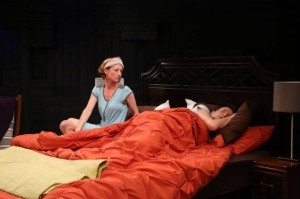
Speaking of kids, I understand you now have a small child?
Julia Cho: Yes. So thank you for the phone. Time’s an issue.
Well, I hope someone's taping this for you. Your actors are doing such wonderful work.
Julia Cho: That really is the heartbreak of it. I wish I could just step into a little wormhole and transport myself to the theater. Marcia [Jean Kurtz, director] has been so lovely and the actors seem to have created a really nice bond with each other. I find it very sad that I can't actually see what they're doing!
Have they tried Skyping?
Julia Cho: Y'know, they haven't, I guess that's a good point, but every time I see a recording though of anything in the theater it never quite conveys it. That's partly what I love about theater, that it can't be recorded. But yes, I feel like they probably could just video a little bit with someone's iPhone. Maybe I'll broach that with Marcia towards the end of the run or something.
You should! But rest assured the play's in good hands!
Julia Cho: I'm so glad to hear that.
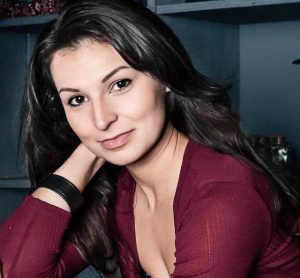 Martyna Majok's play John, Who's Here From Cambridge has been in the hands of director Nick Leavens from the beginning. Like a few other plays in the Marathon, it began as part of Ensemble Studio Theatre's Brunch series, themed one-act festivals performed on Sundays and written by Youngblood, the under-30 playwright group based at EST. Majok's on her way out of that cohort, but she's not going quietly.
Martyna Majok's play John, Who's Here From Cambridge has been in the hands of director Nick Leavens from the beginning. Like a few other plays in the Marathon, it began as part of Ensemble Studio Theatre's Brunch series, themed one-act festivals performed on Sundays and written by Youngblood, the under-30 playwright group based at EST. Majok's on her way out of that cohort, but she's not going quietly.
Martyna Majok: I’m in Youngblood still. This is the year I turn 30 and I get old and they kick me out... It was my first Brunch and my first year of being in it last year, and the theme was jobs and so the title was “Take This Job and Brunch It!” Y’know, as you do. And I couldn’t think of what to write about and somebody asked what my most interesting job was—the thing that elicits the most responses—and it was working as the personal caregiver for a man with cerebral palsy. I thought there might be something in that so I ended up writing a play about two people that come from different classes—which is somewhat similar to my experience working for this man—I won’t mention his name cause he doesn’t know I wrote a play about him (laughs). One of the things I found most interesting about him as a person in the world versus how a disabled character tends to be portrayed on stage is just the amount of humor and self-awareness that this guy in particular portrayed. And I wanted to translate that snarky self-awareness to the stage, while also not having him be a character who’s so noble and other. So both of these characters because of their class and because of their abilities kind of butt heads and end up becoming close friends. And then a surprise and another surprise. And I also really wanted to stage some of the activities that I would do with this man which included like washing his body. I was like, “Can we have a beautiful disabled man be naked on stage and wash his body?” And they’re like “Sure! It’s EST, it’s fine!” So they did it and now it’s on stage again.
How did he take to that?
Oh, he was ready to drop trou. It was originally my concern for him. But he has very strategically placed hands in the scene.
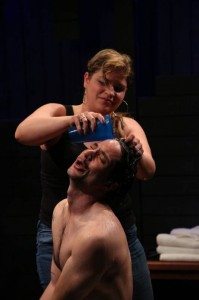
You knew him beforehand?
I did. I met him Gregg [Mozgala, who plays John] four years ago. I worked with a disabled playwrights group in Chicago—I don’t have a disability, besides my own poverty. I joined this disabled playwrights group when I was in Victory Gardens—that was the only playwrights group in Chicago that didn’t cost any money. Victory Gardens let me take it so I got to meet a bunch of really interesting and talented disabled writers. One of them is a writer named Todd Bauer, who is a blind playwright. He would go back and forth to New York and so when I came out to grad school I met Gregg through Todd. And when I wrote this piece I guess I had him subconsciously in mind. And he had been doing stuff at EST and I didn’t know and we were kind of reunited. And now I’m expanding the piece and he’s following along with it. So I’ll be doing an extended version of it at the Dorset Theatre Festival this summer and also maybe at Williamstown while I’m up there teaching this summer. I'm throwing in a couple more characters and scenes in it.
That's wonderful that Gregg's staying on. He was in it from the beginning. Did you have the same actress for the Brunch?
No. I had Layla Khoshnoudi, who’s great, and she’s in a Clubbed Thumb show right now. I ended up meeting Paola Lázaro-Muñoz [who plays the role of Jess] from a different reading and she has a wonderful, and definitely different version of the character.
Was she rewritten at all?
Not really. I think I sort of heard the voice that I had in my head for a little while and it made certain lines—I think her going full with certain lines that were in the previous draft enabled me to make the rest of it as full as that one section. Part Two where she’s talking about her other jobs with a rapidity and a North Jersey street ease that I thought “this fits in your mouth really well. Let's bring out more of that.”
You have some good news. It was just announced you’re the Lark PoNY (Playwright of New York) Fellow this year—get your own rent-free apartment and everything!
Martyna Majok: Thank you! I get to kick Eric Dufault (the incumbent PoNY, and a co-Youngblooder of Majok's) out of that apartment! He’s gonna leave me some surprises before he leaves and I’m really concerned about what kind. The apartment gets funneled through so I think it’s something like 9 years of playwrights doing god knows what playwrights do. They apparently have two weeks after Eric leaves where they clean it and fumigate it. So I don’t think whatever he leaves me will survive.
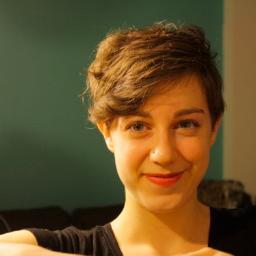 No play on the bill is more about survival than Emma Goidel's We Can All Agree To Pretend This Never Happened, about scientists in Siberia pushing for an end to climate change. Like most of the other plays it also began as another commission.
No play on the bill is more about survival than Emma Goidel's We Can All Agree To Pretend This Never Happened, about scientists in Siberia pushing for an end to climate change. Like most of the other plays it also began as another commission.
Emma Goidel: This play was actually a commission from a company called Tiny Dynamite that produces farcical plays with heart, and they wanted to partner with InterAct for the production, a theater producing plays about political and social issues where I'm in residence as a Core Playwright. They asked me to write a play that married those two missions, and then I read an article about a French team of climate change scientists who discovered an ancient, "live" virus in the melting permafrost. I thought, this is going to go horribly wrong for humanity down the line, and there is definitely a situational climate change farce in this mess.
Do you think you’ve created the world’s first climate change comedy?
No way -- Urinetown! The Toxic Avenger! Maybe this is a new genre. I hope this is a new genre. I co-wrote a comedy with a Philly company last summer about a live-action role-playing climate change apocalypse game. It's definitely in the zeitgeist. I think climate change apocalypse fantasies have been in our cultural consciousness for a while now. Comedy is another apt genre to explore those fears.
Agreed. Though I think it may not be as dire as all that. The comedy is what comes through.
For me this play isn't really about climate change. It's about classical farce-y things: plans going awry, partner swapping, huge silliness taken very seriously and serious things approached with a great deal of silliness. You know, ridiculous stuff. I was super interested in what it would be like to write a contemporary farce from a process standpoint -- I'd never attempted such a tightly plotted structure -- and I also just love the genre; I find it so theatrical, and technically challenging.
I understand you divide your time between New York and Philadelphia. Were you around for rehearsals? Casting?
I was around for casting and the first week of rehearsals, then once before tech and for the final dress -- which I missed half of because of my bad bus karma regarding this production, as you have been witness to.
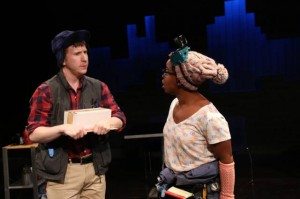
I have borne witness -- Emma nearly missed the company opening due to a certain unreliable-but-cost-effective bus line that shall remain nameless; we chatted over email.
New York is a great place to work and Philly is a great place to come home to. I love splitting my time between the two, though I wish I could have been around more for this production.
I'm glad you made it to the show. Any parting thoughts on Series B?
Series B seems to me to feature plays taking on social and political issues, though I guess that's a pretty broad description. It also, of course, features plays by women with leading parts for women. Which is great to see, considering our industry has a huge problem regarding gender parity for both playwrights and actors.
Series B will be playing through June 20th at Ensemble Studio Theatre's second floor space.
Series B will be performed through June 20 at Ensemble Studio Theatre.